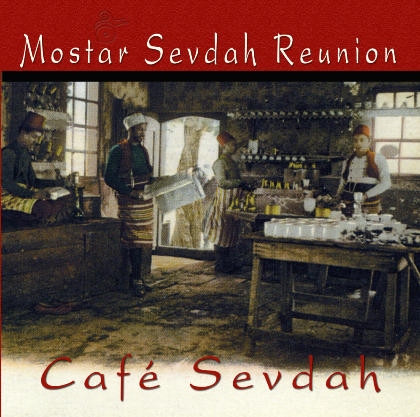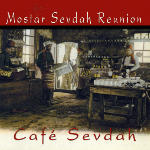
Songs
- artist:MOSTAR SEVDAH REUNION
- region:Balkan
- release year:2007
- style(s):Sevdah
- country:Bosnia and Herzegovina
- formats:Book, CD (Compact Disc)
- record posted by:Snail Records
- label:Snail Records
- publisher:Snail Publishing
- buy this record
Links
Bosnia-Herzegovina's recent history is a sad one; shrouded in the tragedy of a vicious war for independence in the early 1990s which horrified the world and left the country in tatters. Producer Dragi Sestic first formed Mostar Sevdah Reunion at the height of the conflict in 1993, vowing that the world would get to hear what beauty could come from the nation's people once the fighting was over. Understandably, it took until 1998 for the group to release their self-titled first album, but there's little doubt he's succeeded in his mission ever since.
Bosnia-Herzegovina's diverse ethnic melting pot of Serbs, Croats and Bosnian Muslims has been the cause of many of its problems, but it has also given birth to a rich, varied musical tradition that has few equals in Europe. Sevdah, the country's national music, originated around 400 years ago when the Turks occupied much of its territory, and the blend of eastern and Slavic influences on Café Sevdah is subtle yet delicious.
What's more, there are also more contemporary flavours in the mix here. ''Otkako je Banja Luka postala'' is a classic, yearning sevdalinka (love song) with wonderful vocals from Nermin Aluhic Cerhez, but the following track, ''Cije je ono djevojce'' would not sound out of place on a Ry Cooder record with its jazzy piano and vivacious female backing vocals. The tempo changes again on ''Ali-pasa na Hercegovini'' – a slow, meditative chant with strong Arabic textures.
Throughout, the musicianship of the group’s veteran performers is impeccable - wonderfully fluent, sinuous and brimming with passion. While the overall feeling may be melancholy, it's a beautiful kind of sadness that leaves the listener inspired rather than depressed. This reviewer is not the first to label Mostar Sevdah Reunion as the Balkans' answer to Buena Vista Social Club, but lazy journalism or not, the comparison is apposite and well earned.
By Chris WHite (BBC Music Magazine ,October 2007)


